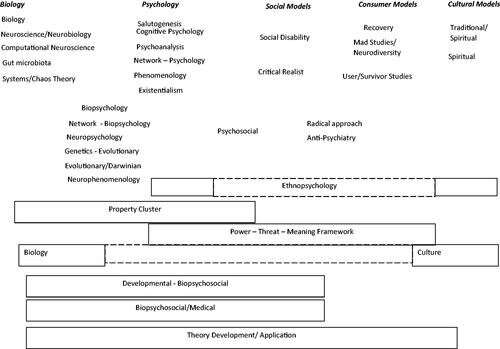Researchers call for greater clarity over what constitutes a mental health problem

A new systematic review from researchers has uncovered a plethora of models used by psychiatrists, psychologists, social scientists, and users of mental health services to understand mental health problems.
A new review of the theoretical models used around the world to assess, diagnose, research, and treat mental health problems has highlighted the vast array of approaches which exist.
Theoretical models refer to a theory, or a set of theories, which seek to explain how an issue should be understood and responded to. A model for mental health problems refers to the causes and characteristics of the condition.
By examining over 100 publications which referenced 'mental health' or 'mental illness' in some way, the researchers from the University of Bath (UK) and Bern University of Applied Sciences (Switzerland) identified some 34 different theoretical models used by practitioners, researchers and users of mental health services to understand the nature of mental health problems.
Importantly, they found no criteria which could be used to prioritize why one model might be used over another. This matters, they say, because how mental health problems are understood has lasting ramifications for how people with mental health problems are assessed and supported.
These ranged from biological models (focussing on problems with the body or brain), to psychological (focussing on the mind and behavior), sociological (focussing how social circumstances affect people), to models which were informed by consumer and cultural considerations (which reflect the experiences of people who have been treated by mental health services and consider how treatments should be adapted to different cultures).
Whilst previously, policymakers and practitioners tried to form consensus about using so-called 'bio-psycho-social models'—a catch-all term, which draws on elements of all different models—this consensus seems to be fracturing, say the researchers.
Publishing their review in the Journal of Mental Health, the team say their findings have important implications in view of the steep increase in mental health problems diagnosed. According to the Mental Health Foundation, in just the past week, it is estimated that one in six of us will have experienced a common mental health problem. However, such figures are dependent on how the problem of mental health is understood and measured.
Co-researcher, Dr. Jeremy Dixon from the University of Bath's Department of Social & Policy Sciences and Centre for the Analysis of Social Policy explains: "Uncertainties about what constitutes a mental health problem have become more pronounced in recent decades due to the increase in the number of mental health conditions being identified in the manuals which are used by general practitioners and psychiatrists.
Professor Dirk Richter, from the Bern University of Applied Sciences adds: "Mental health problems are often presented as something which are understood by medicine and psychiatry. Yet, debate remains about what exactly mental health problems are and how they should be treated. These are not just academic. Questions such as, 'what are mental health problems?' or 'what counts as a mental illness?' have impacts within health care systems. They can affect decisions around who might receive a mental health service and how behaviors such as aggression might be interpreted."
"One way out of this issue could be to ask service users which model they feel to be most appropriate for them and their treatment. The consequence, however, would be that non-medical models might become more important than clinicians would be willing to accept."
In view of the wide range of models that are used by practitioners, the researchers are now calling for greater clarity over how different and potentially contracting mental health models can be used in practice. They argue that this debate needs greater input from non-medical professions and service users.
"Mental health practitioners tend to say that they use a bio-psycho-social model in their everyday work, but our research shows that this model is fracturing. Whilst this field has been dominated by psychiatry and psychology, the perspectives of users of services and other professionals such as nurses and social workers are now beginning to be heard," adds Dr. Dixon.
"Mental health services need to recognize the wide range of perspectives which are now held by those who use services. Rather than insisting users of services accept biological or psychological perspectives, mental health professionals need to understand and work to people's preferences," says Professor Richter.
More information: Dirk Richter et al, Models of mental health problems: a quasi-systematic review of theoretical approaches, Journal of Mental Health (2022). DOI: 10.1080/09638237.2021.2022638


















